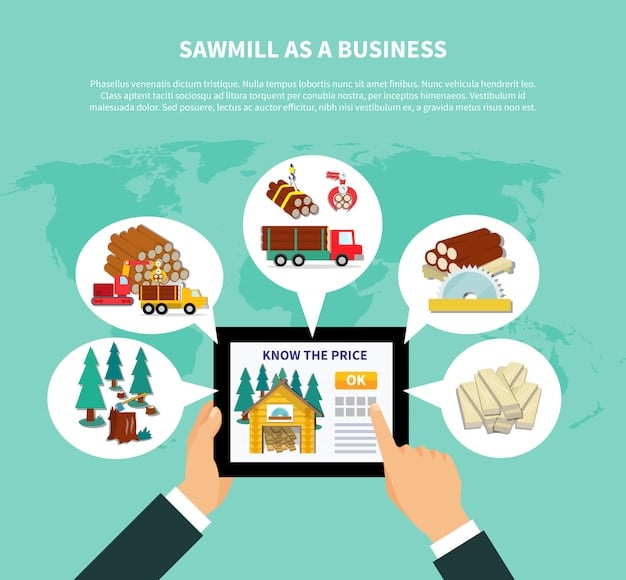Zero-Based Budgeting: Control Your Finances in 2025

Zero-based budgeting is a method where every dollar is assigned a specific purpose at the start of each month, requiring you to justify all expenses and ensuring you allocate your funds intentionally for proactive financial control in 2025.
Anúncios
Take control of your finances and achieve your financial goals with zero-based budgeting. This guide will provide you with a practical roadmap to effectively implement zero-based budgeting in 2025, ensuring every dollar you earn is intentionally allocated.
What is Zero-Based Budgeting?
Zero-based budgeting (ZBB) isn’t just another budgeting method; it’s a complete financial reset. Unlike traditional budgeting, where you base your future spending on past expenditures, ZBB starts from scratch each month.
With zero-based budgeting, you treat every month as a blank slate, forcing you to justify every expense you plan to make.
The Core Principle: Justify Every Expense
The fundamental idea behind ZBB is that every dollar needs a job. You allocate funds to different categories—housing, food, transportation, entertainment—until your income minus your expenses equals zero. This doesn’t mean you literally have no money left; instead, every dollar is accounted for, whether it’s going towards bills, savings, or investments.
How It Differs from Traditional Budgeting
Traditional budgeting often relies on historical data. You look at what you spent last month and make adjustments. ZBB disregards this historical data. It asks, “What should I be spending my money on this month based on my current priorities and goals?” This forward-looking approach makes ZBB particularly effective for identifying areas where you can cut costs and reallocate resources.
- Fresh Start Each Month: No reliance on past spending habits.
- Focus on Priorities: Aligns spending with current financial goals.
- Resource Reallocation: Easily identifies and corrects inefficient spending.
In essence, zero-based budgeting is about being intentional with your money. It’s about making sure that your spending reflects your values and priorities, not just your habits.
Benefits of Zero-Based Budgeting in 2025
Why embrace zero-based budgeting as we approach 2025? The benefits extend beyond simple money management. It is about financial empowerment and strategic resource allocation.
The advantages of zero-based budgeting can lead to transformative financial outcomes. It’s a proactive approach that fosters a deeper understanding of your financial landscape.
Enhanced Awareness of Spending Habits
One of the immediate benefits of zero-based budgeting is the heightened awareness it brings to your spending habits. By meticulously planning each month, you gain a clearer understanding of where your money is actually going.
This detailed approach forces you to confront every expense, no matter how small. You’ll quickly identify areas where you’re overspending or where your money isn’t aligned with your priorities.
Improved Savings and Debt Reduction
Zero-based budgeting is a powerful tool for accelerating your savings goals and tackling debt. By consciously allocating every dollar, you can prioritize debt repayment and set aside more money for savings.
This method ensures that you’re not just saving whatever is left over at the end of the month. Instead, savings become an integral part of your budget, planned and intentional.
- Debt Prioritization: Allocate more funds to high-interest debts.
- Savings Goals: Plan specific amounts for emergency funds or investments.
- Financial Discipline: Encourages consistent adherence to budget.
Ultimately, the benefits of zero-based budgeting are about more than just managing money; they’re about achieving financial clarity, discipline, and empowerment.
Step-by-Step Guide to Implementing Zero-Based Budgeting
Ready to put zero-based budgeting into action? This step-by-step guide breaks down the process into manageable steps to help you take control of your finances.
Each step is essential for creating a zero-based budgeting system that works for you, fostering financial clarity and control.
Step 1: Calculate Your Monthly Income
Start by accurately determining your total monthly income. This includes your salary after taxes, any side hustle income, and any other regular sources of cash flow. Be precise to lay a solid foundation for your budget.
Knowing your exact income is crucial because it sets the limit for how much you can allocate. Without an accurate figure, your budget won’t be realistic.
Step 2: List Your Monthly Expenses
Next, create a comprehensive list of all your monthly expenses. This should include both fixed expenses (like rent, mortgage, and loan payments) and variable expenses (like groceries, utilities, and entertainment). Review bank statements and credit card bills for accuracy.
Categorize your expenses to see where your money is going. Separate needs from wants to make informed decisions about where to cut back.
Step 3: Allocate Funds to Each Expense Category
Now, allocate a specific amount to each expense category. Prioritize essential expenses first, such as housing, food, and transportation. Then, allocate funds to other categories based on your priorities and financial goals.
The goal is to allocate every dollar of your income until you reach zero. If your expenses exceed your income, identify areas where you can cut back.
Step 4: Review and Adjust Your Budget
After creating your initial budget, take time to review and adjust it as needed. Compare your planned spending to your actual spending to identify any discrepancies. Make adjustments to ensure your budget aligns with your financial goals.
Flexibility is key. As your income or expenses change, adjust your budget accordingly. Regularly reviewing and adjusting your budget will help you stay on track.
- Track Spending: Use budgeting apps or spreadsheets to monitor expenses.
- Identify Discrepancies: Compare planned versus actual spending.
- Stay Flexible: Adjust budget as income and expenses change.
By following these steps, you’ll be well on your way to mastering zero-based budgeting and achieving your financial objectives.
Tools and Resources for Zero-Based Budgeting
To effectively implement zero-based budgeting, it’s helpful to leverage various tools and resources. Whether it’s budgeting apps, spreadsheet templates, or expert advice, the right resources can streamline the process.
Using technology and expert guidance can simplify zero-based budgeting, making it more accessible and effective for everyone.
Budgeting Apps
Budgeting apps are designed to simplify the process of tracking income, expenses, and budget allocations. Many apps offer features that are specifically tailored to zero-based budgeting.
Popular options include YNAB (You Need A Budget), Mint, and Personal Capital. These apps can help you monitor your spending in real-time, categorize expenses, and identify areas where you can save.
Spreadsheet Templates
For those who prefer a more hands-on approach, spreadsheet templates can be an excellent resource. A well-designed spreadsheet can help you organize your income and expenses, allocate funds to different categories, and track your progress over time.
You can find free zero-based budgeting templates online or create your own using software like Microsoft Excel or Google Sheets.
Financial Advisors and Coaches
Sometimes, professional guidance can make a significant difference. Financial advisors and coaches can provide personalized advice and support, helping you create a zero-based budget that aligns with your specific financial goals. They can also offer strategies for debt reduction, savings acceleration, and investment planning.
Consider consulting a financial expert for tailored advice and ongoing support.
By leveraging these tools and resources, you can optimize your zero-based budgeting efforts and achieve greater financial success.
Common Pitfalls to Avoid in Zero-Based Budgeting
While zero-based budgeting can be incredibly effective, it’s not without its challenges. There are several common pitfalls that people encounter when implementing this budgeting method. Avoiding these mistakes can significantly improve your chances of success.
Understanding these potential problems, will help you navigate the zero-based budgeting process more smoothly and effectively.
Underestimating Expenses
One of the most common mistakes is underestimating your expenses. This can lead to an inaccurate budget that doesn’t reflect your actual spending. Always be thorough when listing your expenses and consider using past bank statements and credit card bills as a reference.
Include all expenses, both fixed and variable, and add a buffer for unexpected costs.
Failing to Track Spending
Creating a budget is only half the battle. You also need to track your spending to ensure you’re sticking to your plan. Failing to monitor your expenses can lead to overspending and derail your budget.
Use budgeting apps or spreadsheets to track your spending in real-time. Regularly review your budget and make adjustments as needed.
Not Being Flexible
Life is unpredictable, and your budget needs to reflect that. Not being flexible and unwilling to adjust your budget as your circumstances change can lead to frustration and failure.
- Unexpected Expenses: Plan for emergencies with a dedicated fund.
- Income Fluctuations: Adjust budget based on income changes.
- Review Regularly: Make ongoing adjustments to stay on track.
By avoiding these common pitfalls, you’ll be better positioned to harness the full potential of zero-based budgeting.
Adapting Zero-Based Budgeting for 2025 and Beyond
As we look ahead to 2025 and beyond, adapting zero-based budgeting to evolving financial trends and technologies will be essential. The financial landscape is constantly changing, and your budgeting strategy should evolve with it.
Staying ahead with zero-based budgeting requires embracing new tools, strategies, and perspectives. Adapting to these changes will ensure your financial plans remain effective and relevant.
Embracing Fintech Solutions
Financial technology (fintech) continues to advance, offering new tools and solutions that can enhance your budgeting efforts. From AI-powered budgeting apps to automated savings tools, fintech can streamline and optimize your zero-based budgeting process.
Explore the latest fintech offerings and integrate them into your financial management routine.
Considering Inflation and Economic Changes
Inflation and economic changes can significantly impact your budget. As the cost of goods and services rises, you’ll need to adjust your allocations to reflect these changes.
Stay informed about economic trends and adjust your budget accordingly. Regularly review your expenses and make adjustments to accommodate inflation.
Integrating Long-Term Financial Goals
Zero-based budgeting isn’t just about managing your monthly expenses; it’s also about achieving your long-term financial goals. Integrate your long-term objectives, such as retirement savings, homeownership, or education funding, into your budgeting process.
Allocate funds to your long-term goals each month, ensuring you’re making progress towards your future financial security.
- Retirement Planning: Allocate funds to retirement accounts.
- Homeownership: Save for a down payment and closing costs.
- Education Funding: Plan for college tuition and expenses.
By adapting your zero-based budgeting strategy to these evolving trends, you can ensure your financial well-being in 2025 and beyond.
| Key Concept | Brief Description |
|---|---|
| 💰 Income Calculation | Determine your total monthly income from all sources. |
| 🧾 Expense Listing | Create a detailed list of all monthly expenses, fixed and variable. |
| 🎯 Fund Allocation | Allocate funds to each expense category until income reaches zero. |
| 🔄 Budget Review | Regularly review and adjust your budget for accuracy. |
Frequently Asked Questions
Zero-based budgeting requires justifying every expense each month, while traditional budgeting adjusts past spending. ZBB provides a fresh start every month for better financial control, whereas traditional budgeting relies on historical data.
You should review your zero-based budget at least once a month to track spending and identify discrepancies. Adjustments should be made whenever there are changes in income, expenses, or financial goals to ensure accuracy.
If your expenses exceed your income, prioritize essential expenses and identify areas where you can cut back. Consider reducing non-essential spending, finding additional income sources, or re-evaluating financial goals.
Yes, zero-based budgeting can be a useful method for debt reduction. By allocating funds to debt payments each month, you can prioritize debt repayment and accelerate the process of becoming debt-free, so it could be an awesome tool.
There are several recommended tools and apps for zero-based budgeting, including YNAB (You Need A Budget), Mint, and Personal Capital. There are also spreadsheet templates that simplifies tracking income, managing expenses, and allocating funds.
Conclusion
Zero-based budgeting offers a proactive and empowering approach to financial management. By starting from zero each month and intentionally allocating every dollar, you can gain greater control over your finances, achieve your financial goals, and adapt to the ever-changing economic landscape. Embrace zero-based budgeting in 2025, and beyond, for a more secure financial future.







